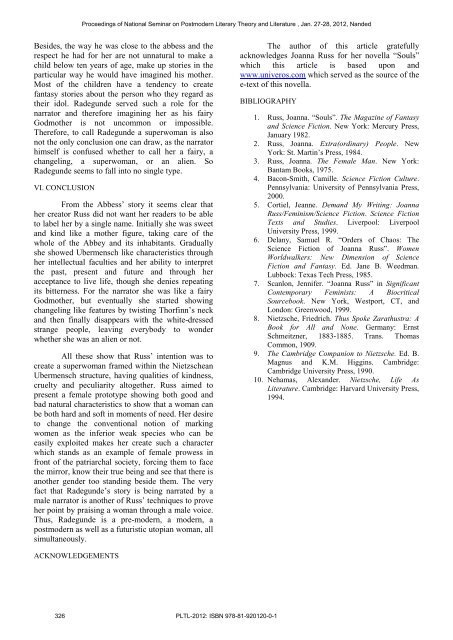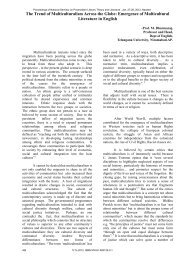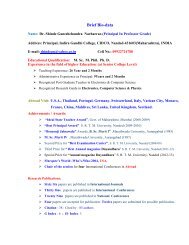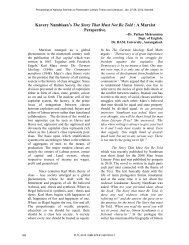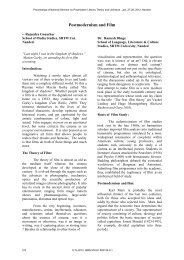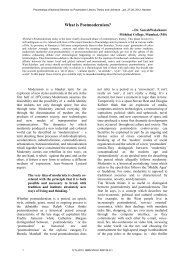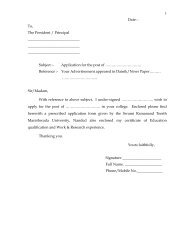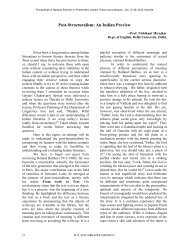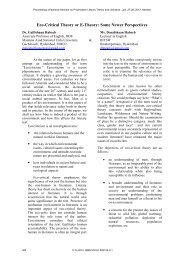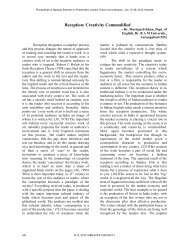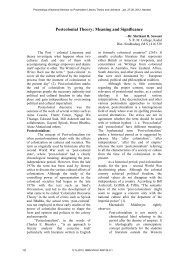Proceedings of National Seminar on Postmodern Literary <strong>Theory</strong> and Literature , Jan. 27-28, 2012, NandedAbbess Radegunde is something very close to that ofNietzsche’s Ubermensch. In the first stage of thethree steps of metamorphosis, she is loaded with theChristian values to bear and she bears them withgreat responsibility. In the second stage, she rebelsagainst the values of spiritual purity and physicalchastity when she feels physical, sexual attraction forthe statue of Apollo at Rome. In her final stage, sheovercomes her inner struggles twice, once as shemakes herself return to the stern Christian values ofchastity and again as she understands the meaning oflife through her own experiences and serves forhumanity, which according to her own words is theresult of her own will. Thus, she stands up straight tobe compared to the Nietzschean Ubermensch wholives and leaves her life as an example for others tofollow. Russ is pretty intelligent in her choosing ofthe Ubermensch as a female character who actsagainst the Norsemen in a quite interesting way,tricking them by her powerful speeches and hersuper-womanly supernatural qualities. AbbessRadegunde is thus a strong voice against patriarchyand though set within a twelfth century context,shows very clearly how women should be like notonly in the twenty first century but also in thefuturistic society which is yet to be experienced.IV. THE CONTRAST WITH THE UBERMENSCHAbbess Radegunde’s story and her character,as experienced by a seven years old young boy whoserves as the narrator of “Souls”, leave behind thescope of questioning the true Nietzschean valuesvisible within this character. At one hand, she isabove the level of normal human beings because shehas extra-ordinary skills in learning andremembering things. She knew Latin at a very tenderage of four and could read many languages as well.She showed unique mental faculties which made herAbbess send her to Rome to carry on learning moreaccurately. The way she is gifted with foresight andthe way she fights an intellectual battle against theNorsemen and defeated them successfully, resultingin saving her wards from the fierce Viking men areworth mentioning. On the other hand, she fails torepeat the same life though she understands itsworth. After releasing her wards and after giving anessential insight to Thorvald, the leader of the groupof Norsemen, which will help him save the Abbeyand its inhabitants, Abbess Radegunde leaves theworld with the group of other-worldly extraterrestrialpeople who came to take her back withthem. This shows that though she possesses theinsight to analyse the past, present and future, sheseems to lack the courage to accept the bitterness oflife as she fails to live life all again within its worstconditions. She appears to escape into another world,perhaps a better one, when she finds it difficult tolive on earth. This other world of white-dressedsaints seems to represent the other-worldliness whichCatholicism promises as an after-life. Therefore,Russ’ scientific ending showing Radegunde as analien serves as a trope of attributing to the Christianvalues which Nietzsche tries to run away from.Moreover, Russ moves away from theconventional notion of the Nietzschean Ubermenschbecause her intention is not only to provoke thesuper-natural feeling within her readers, but also toraise a gender awareness which will help her conveyher feminist message. She feels that using a humanbeing for the purpose of her message is not sufficientas a human female lacks the super-natural powersrequired to transgress the worldliness and itsattributes. In her other novels as well, like TheFemale Man and the other stories of Extra(ordinary)People she uses the character of the Superwoman,with unnatural characteristics and prowess whichwill be able to crush man down with one blow.Hence, the use of science fiction is evident in herwritings. Abbess Radegunde is perhaps such ascientific creation which lies above the humanpower, intelligence or understanding. Russ shows heras an alien because she thinks that only an alien canserve her purpose of transgressing the worldliness.Therefore Radegunde cannot be called a properUbermensch in the Nietzschen sense of the term,because though she lives with human beings, she isherself an alien and not a common worldly womanwho overcomes being common.V. THE MALE NARRATORThe figuring of the abbess has anotherperspective. As it is evident from the beginning ofthe novella, her story is narrated by a man who hasexperienced her living period as a boy of seven yearsold. There lies the question. Can the experiences of achild as tender as seven years old be regarded to betrue? They can merely be the hallucinations of ayoung child who might perhaps have f<strong>org</strong>ottenevents. Though he keeps on claiming that heremembers everything by very clearly stating at thebeginning that he is not telling it as it was told to himbut as he saw it, he should not be trusted blindly forhe does not f<strong>org</strong>et to mention that he was a childthen. Throughout the novel, the narrator keepsmentioning how young he was when he used to livein the Abbey as Radegunde’s foster child, how timidand shy he was and how fond he was of his fostermother. At one hand, his tenderness gives the hintthat the whole story about the abbess can be hishallucinations, and at another hand it can also be theimaginations of a seven years old child’s mind.325 PLTL-2012: ISBN 978-81-920120-0-1
Proceedings of National Seminar on Postmodern Literary <strong>Theory</strong> and Literature , Jan. 27-28, 2012, NandedBesides, the way he was close to the abbess and therespect he had for her are not unnatural to make achild below ten years of age, make up stories in theparticular way he would have imagined his mother.Most of the children have a tendency to createfantasy stories about the person who they regard astheir idol. Radegunde served such a role for thenarrator and therefore imagining her as his fairyGodmother is not uncommon or impossible.Therefore, to call Radegunde a superwoman is alsonot the only conclusion one can draw, as the narratorhimself is confused whether to call her a fairy, achangeling, a superwoman, or an alien. SoRadegunde seems to fall into no single type.VI. CONCLUSIONFrom the Abbess’ story it seems clear thather creator Russ did not want her readers to be ableto label her by a single name. Initially she was sweetand kind like a mother figure, taking care of thewhole of the Abbey and its inhabitants. Graduallyshe showed Ubermensch like characteristics throughher intellectual faculties and her ability to interpretthe past, present and future and through heracceptance to live life, though she denies repeatingits bitterness. For the narrator she was like a fairyGodmother, but eventually she started showingchangeling like features by twisting Thorfinn’s neckand then finally disappears with the white-dressedstrange people, leaving everybody to wonderwhether she was an alien or not.All these show that Russ’ intention was tocreate a superwoman framed within the NietzscheanUbermensch structure, having qualities of kindness,cruelty and peculiarity altogether. Russ aimed topresent a female prototype showing both good andbad natural characteristics to show that a woman canbe both hard and soft in moments of need. Her desireto change the conventional notion of markingwomen as the inferior weak species who can beeasily exploited makes her create such a characterwhich stands as an example of female prowess infront of the patriarchal society, forcing them to facethe mirror, know their true being and see that there isanother gender too standing beside them. The veryfact that Radegunde’s story is being narrated by amale narrator is another of Russ’ techniques to proveher point by praising a woman through a male voice.Thus, Radegunde is a pre-modern, a modern, apostmodern as well as a futuristic utopian woman, allsimultaneously.The author of this article gratefullyacknowledges Joanna Russ for her novella “Souls”which this article is based upon andwww.univeros.com which served as the source of thee-text of this novella.BIBLIOGRAPHY1. Russ, Joanna. “Souls”. The Magazine of Fantasyand Science Fiction. New York: Mercury Press,January 1982.2. Russ, Joanna. Extra(ordinary) People. NewYork: St. Martin’s Press, 1984.3. Russ, Joanna. The Female Man. New York:Bantam Books, 1975.4. Bacon-Smith, Camille. Science Fiction Culture.Pennsylvania: University of Pennsylvania Press,2000.5. Cortiel, Jeanne. Demand My Writing: JoannaRuss/Feminism/Science Fiction. Science FictionTexts and Studies. Liverpool: LiverpoolUniversity Press, 1999.6. Delany, Samuel R. “Orders of Chaos: TheScience Fiction of Joanna Russ”. WomenWorldwalkers: New Dimension of ScienceFiction and Fantasy. Ed. Jane B. Weedman.Lubbock: Texas Tech Press, 1985.7. Scanlon, Jennifer. “Joanna Russ” in SignificantContemporary <strong>Feminist</strong>s: A BiocriticalSourcebook. New York, Westport, CT, andLondon: Greenwood, 1999.8. Nietzsche, Friedrich. Thus Spoke Zarathustra: ABook for All and None. Germany: ErnstSchmeitzner, 1883-1885. Trans. ThomasCommon, 1909.9. The Cambridge Companion to Nietzsche. Ed. B.Magnus and K.M. Higgins. Cambridge:Cambridge University Press, 1990.10. Nehamas, Alexander. Nietzsche, Life AsLiterature. Cambridge: Harvard University Press,1994.ACKNOWLEDGEMENTS326 PLTL-2012: ISBN 978-81-920120-0-1


